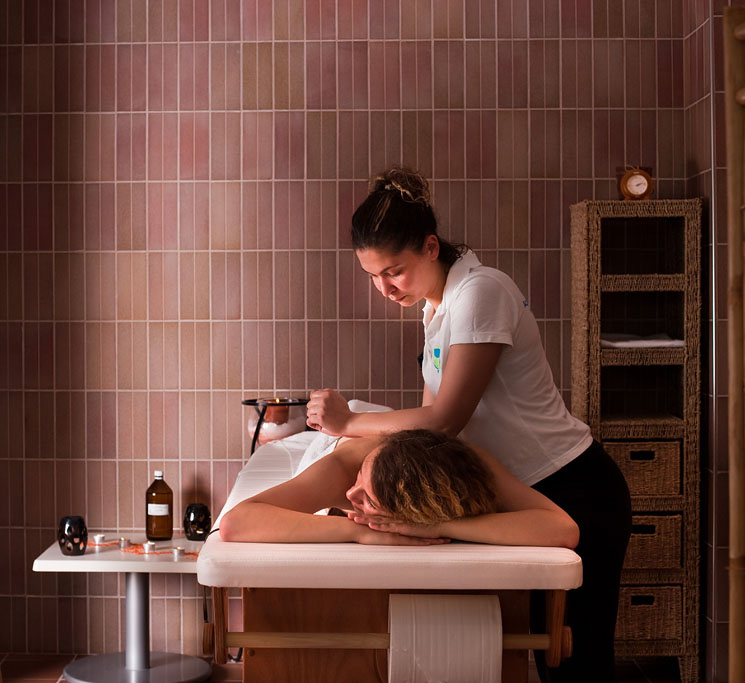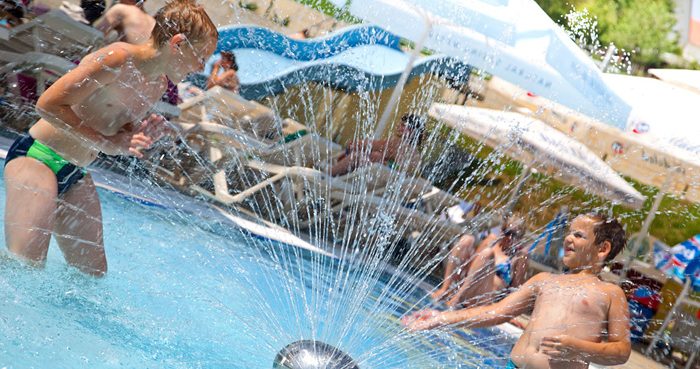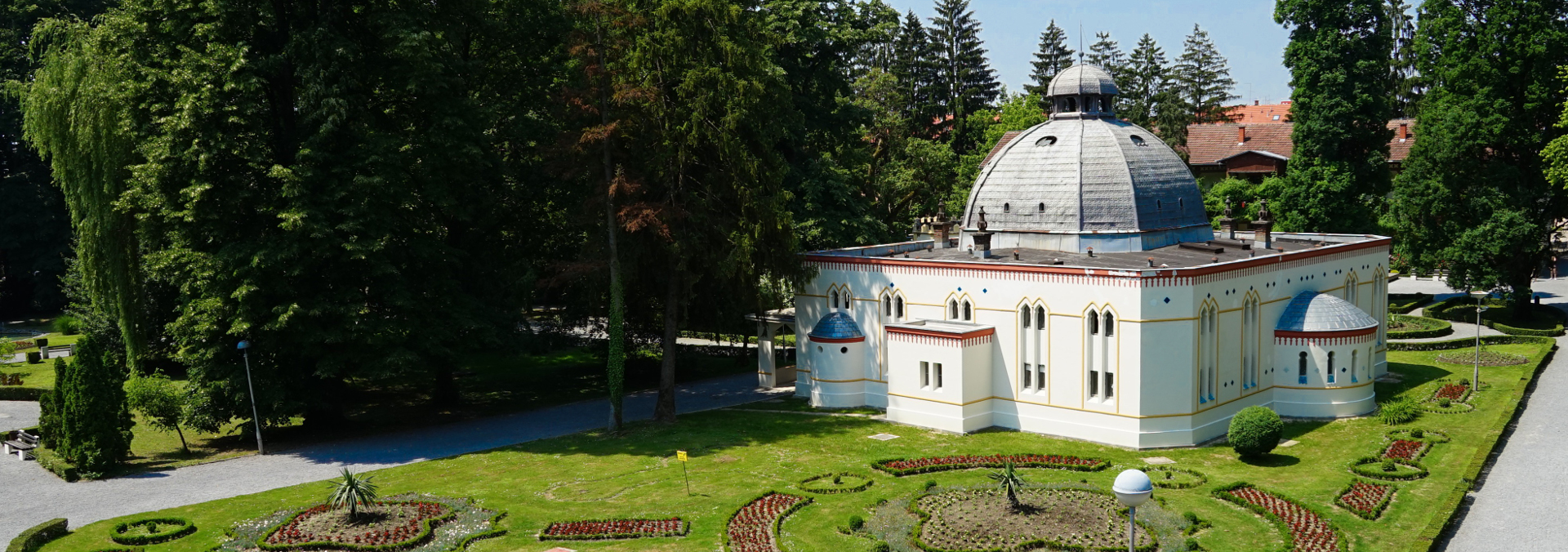Located along the Toplica river, in northeastern Croatia, the town of Daruvar has grown around its thermal complex, built directly above the healing thermal springs. Celts, Romans, Ottomans, Austro-Hungarian aristocracy… All of them appreciated the healing qualities of its waters and muds, which have been treating infertility in women for over two thousand year and are also renowned for medical rehabilitation and the treatment of rheumatic diseases.
In recent years, Daruvar’s Spa, set in the beautiful landscaped thermal park of Julije, in the heart of the town, has become a popular recovery and training destination for world-class athletes. Besides medical treatment programmes, the spa offers wellness and relaxation, plenty of accommodation, an excellent cuisine and wine-production and many sporting and cultural activities – including many festivals!

Daruvar
Historical Background
The oldest known settlement in the area of Daruvar, close to the springs, dates from the 4th century BC, although archaeological findings show that it was already inhabited in the Stone Age.
Romans settlers allied with the local Celtic Pannonian tribe, known by Greeks and Romans as Iasi (“healers”), as they were already familiar with the use of the thermal springs, and found the place of Aqua Balissae (“Very strong springs”). They built an important thermal complex which welcomed visitors like Roman emperors Hadrian (117.-138.), Commodus (180.-192.) and Constantine the Great (305.-307) . The baths were dedicated to deities Diana, Svilan and Sol, in the belief they were responsible for the healing properties of the springs, and include hot, warm and cold baths and special rooms for massage and sweating, as well as public pools that were used by soldiers for rest and recuperation.
After the fall of the Roman Empire, the Croats founded the villages of Probatica, later Podborje, later ocuppied by the Ottoman Empire in the 16th century. In the 18th Century, Austro-Hungarian count Antun Janković received the state from Queen Maria Theresa and built a castle named Daruvar, which would end naming the whole settlement, which started developement several spa facilities: Antun’s bath (1772), the Swiss Villa (1860), Arcadia from (1870) and the Central Mud Baths, in 1909, surrounded by the large spa park.
The Central Mud Bath in Daruvar was built in a Moorish style in 1909, directly over Roman foundations and the hot springs, in the centre of Julije’s Spa Park.
Recently restored to its former glory, the Central Mud Bath, with its octagonal cupula is the symbol of the town.
The waters
Springs & Spas
Two mineral and three muddy mineral thermal springs supply Daruvar with its famous waters, producing around 30 liters per second. They are acratotherme , with almost identical chemical compositions, but varied in temperature, ranging from 39.2 to 47.7, average 46.7 degrees Celsius. . According to International Classifications, they are calciumhydrocarbonated waters, being calcium and magnesium the predominant elements from cations, and hydrocarbons from anions, showing low radioactivity levels. They are vadose waters, thus existing above the phreatic zone, and arise along the banks of Toplica river, between the western slope of Papuk ranges and Ilova depression, flowing out of Triassic limestones and dolomites which are covered with 6 to 13 meters of thick alluvial sediments.
Water is Daruvar are also rich in peloids, mineral muds of azure blue clay mixed with tiny grains of quartz sand and other organic and inorganic compounds, all of volcanic origen. They are used as mud wraps and are an important element of the water cures..
Daruvar spa is the leading healthcare centre in Croatia. With a long tradition in the application of mineral waters and mud for health purpouses, modern medical equipment and innovative methods of physical therapy, it is specialized in the treatment of rheumatic diseases, medical rehabilitation and in assisted treatment of infertility - ‘Joy of Life’.
Besides their health programmes (from a simple 3-therapies package to a full treatment), the centre offers special medical treatments for athletes, medically programmed active holidays packages, as well as team-building and well-team programmes that include fun and exciting activities!. Nutrition is also an integral part of the cures at the centre, offering personalized nutritional consultation, individual menus, dietotherapy, and weight-loss programmes.
The 1800sq m facilities include two indoor and outdoor swimming pools, and a Wellness-spa center, an additional facility which includes the "Spa Oasis", equipped with jacuzzi, Finnish sauna, Turkish steam baths, infrared sauna, solarium and a fitness workout area. Among the wide range of beauty and wellness programmes you may find different massages, lymphatic drainage, treatments with hot volcanic stones, olive oil and salt, algae, chocolate, milk and honey, spices and aromatic plants, etc. along with specific facial care solutions and, of course, Daruvar's famous therapeutical mud wraps.


If you are traveling with children or just looking for a fun easy-going experience, you may want to visit the thermal water park "Aquae Balissae", a water oasis in the best decorated small town in continental Croatia that extends to 10.000 m2 of which 2.200 m2 of water surface. Located just 300 meters away from the spa, Aquae Balissaee uses only geothermal water with the average temperature of 32ºC in the pools. .
Through the year there are indoor swimming pools with four 25-metre swimming lanes, slides and whirlpools, and during the Summer, several water atractions including an "slow river" 220 meters long. Its "Peace Oasis" is a relaxing place with saunas and a massage area where to forget everyday stress.
Springs
Antun, Ivan, Marija
Earliest known use
2nd century BC
Hottest Spring
46ºC
Chemical Elements
Iron
Culture & Gastronomy
More than water
Daruvar is set in the heart of a region which has been devoted to wine-growing for centuries, favored by the sunny slopes of Mount Papuk, with excellent varieties of grapes and wines known worldwide. This long wine tradition goes back even to Romans, as testified by the discovery, in 1789 of a diatreta , a glass goblet known as the “Vas diatretum Daruvarense”.
To explore this tempting heritage it is possible to run along Daruvar’s Wine Route . Starting at the town center, this 7-stop trips include wine tasting session from Daruvar’s most popular wines: Graševina, Rhine Riesling, Chardonnay and Sauvignon and goes trough stunning vineyards landscapes and family wineries, all with their particular flair.
Wine is also a topic for Daruvar’s cultural programme, with important events like the International Wine Exhibition Vinodar or the celebrations of Saint Martin’s day, when the young wine is “baptised” and everyone can enjoy it.
Because of its long history, Daruvar is today an example of multiculturalism, with many traditions taken from the different communities set here. As the center of the Czechs in Croatia, Daruvar is home to country’s oldest brewery, specialising in Czech beer-making methods, and celebrates every year the harvest ceremony- Dožinky. Also very popular are the festival “Maska”, music festival “Darfest”, and the Plum’s days in Sirač, where you can learn how to prepare beverages and desserts with this fruit.

